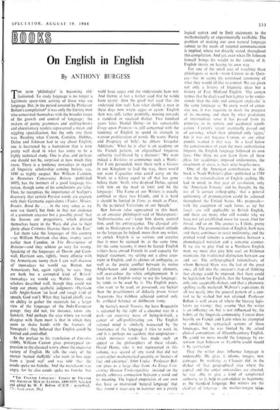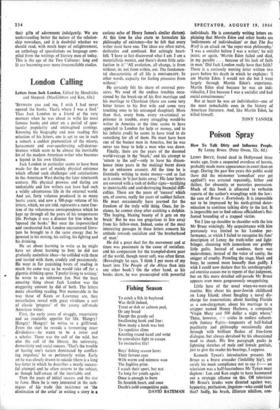On English in English
By ANTHONY BURGESS
MHE term 'philologist' is becoming old- I fashioned. To study language is no longer a legitimate spare-time activity of those who use
language. But, in the period covered by Professor Bolton's compilation* it was only the literary men who concerned themselves with the broader issues of the growth and control of language: the makers of penny grammars and spelling-books and elocutionary readers represented a mean and niggling specialisation, but the only one there was. Reading what Caxton, Camden, Hobbes, Defoe and Johnson had to say about English, one is heartened by a humanism that is now pretty well dead in what has come to be a highly technical study. One is also, and perhaps one should not be, surprised at how much they knew. There is a tendency nowadays to regard all linguistic scholarship coming before, say, 1890 as highly suspect. But William Camden, in Remaines Concerning Britain (published 1605), has the instincts of a good language his- torian, though some of his conclusions are false.
Thus, he recognises the importance of Scaliger's discovery that certain Persian words are cognate with their Germanic equivalents eFader. Moder, Bugler, Band &c . . . in the very sence as we now vse them'), but finds in that not evidence of a common ancestor but a possible proof that the Saxons our progenitors, which planted themselves heere in the West, did also to their glorie place Colonies likewise there in the East.'
Let them take the languages of this country —as William Harrison also does, twenty years earlier than Camden, in The Description of Britaine—and they seldom go very far wrong. Speaking of the languages of Devon and Corn- wall, Harrison sees, rightly, 'more affinitie with the Armoricane toong than I can well discusse of (nowadays we would say Breton. not Armorican), but, again rightly, he says. they are both but a corrupted kind of British' (nowadays we would say Welsh). These old scholars described well, though they could not keep out phony aesthetic judgments +Harrison calls Anglo-Saxon 'an bard and rough kind of speech, God wot'). What they lacked chiefly was an ability to gather the materials for a larger view of the languages of the Indo-European group: they did not, for instance, know any Sanskrit. And perhaps the area where we would disagree with them most is that in which they seem to shake hands with the framers of Newspeak : they believed that English could be limited and controlled.
In the preface to his translation of Erteydos (1490), William Caxton gives prototypical ex- pression to the classical worry about the excessive variety of English. He tells the story of the mercer 'named sheffelde' who went to buy eggs from a 'good wyf' and was told 'that 'he coude speke no frenshe. And the marchaunt was angry. for he also coude speke no frenshe but
*THE ENGLISH LANGUAGE: ESSAYS BY EN(.1.ISH AND AMERICAN MEN OF LETTERS, 1490-1839. Selected and edited by W. F. Bolton. (C.U.P..: paperback. 15s-; hard cover, 30s.) '
wold haue egges and she vnderstoode hym not. And thenne at last a nother sayd that he wolde haue eyren/ then the good wyf sayd that she vnderstod him wel/ Loo what sholde a man in thyse days now wryte. egges or eyren.' English then was still, rather painfully, moving towards a standard or received dialect. Two hundred years later, Daniel Defoe—in his remarkable Essay upon Projects—is still concerned with the tendency of English to spend its strength in wanton proliferation of words. He wants Purity and Propriety of Stile'; he abhors 'Irregular Additions.' What he is after is an academy on the French pattern, an oligarchical linguistic authority trail-blazed by a dictator: 'We want indeed a Richlieu to commence such a Work: For 1 am. persuaded, were there such a Genius in our Kingdom to lead the way, there wou'd not want Capacities who cou'd carry on the Work to a Glory equal to all that has gone before them.' Swift, who despised Defoe, agreed with him on the need to limit and fix the language: 'The Fame of our Writers is usually confined to these two Islands, and it is hard it should be limited in Time, as much as Place, by the perpetual Variations of our Speech.'
Ben Jonson (also represented in this book as an amateur philologist) said of Shakespeare: 'Sufilarninandus est'—keep him down, control him, cool his extravagance. The classical atti- tude to Shakespeare is also the classical attitude to the language he helped, more than any writer, to enrich. English is so various and creative that it must be rejoiced in; at the same time, for the same reasons, it must be feared. English writers have envied French its cool capacity for logical statement; try setting out a close argu- ment in English, and its chimes of ambiguity, as well as the poetic conflict between its native Anglo-Saxon and imported Latinate elements, will over-colour the white enlightenment. It is hard for an English writer to use his language: he tends to be used by it. The English poets, who want to be used, or possessed, are luckier than the practitioners of didactic prose. Great Augustans like Gibbon achieved control only by artificial balance or deliberate irony.
In Sartre's novel .Nausea, the hero Roquentin is sickened by the sight of a chestnut tree in a park—an excessive mass of being-in-itself, a cancer of self-proliferating yin. The English rational mind is similarly nauseated by the luxuriance of the language it tries to work in, and it is perhaps no accident that empiricism— which mistrusts words----has made such an appeal to the philosophers of these islands. David Hume, who is not represented in this volume, was scared of any word that' did not assert either mathematical quantity or `matters of fact and existence'; John Locke--Professor Bol- ton gives us a large slice from An Essay Con- cerning Human Understanding- --insisted on the purely arbitrary connection between a word and its meaning. The logical empiricists of our own day have so mistrusted 'natural language' that they found it necessary to hammer out a purely logical syntax and .to limit statements to the mathematically or experimentally verifiable. The
problem of making our own natural language submit to the needs of rational communication is implied, where not directly stated, throughout this compilation. And yet, even when Dr Johnson himself brings his weight to the taming of it. English insists on having its own way.
For one of the small joys of watching these philologists at work—from Caxton to de Quin- cey—lies in seeing the continued autonomy of what they would all like to control. We are given not only a history of linguistic ideas but a history of East Midland English. 'The comyn
termes that be dayli vsed ben lyghter to be vnder- stonde than the olde and auncyent englysshe' is
the same language as 'In every word of exten- sive use, it was requisite to mark the progress of its meaning, and show by what gradations of intermediate sense it has passed from its primitive to its remote and accidental signifi- cation.' Caxton's 'eyren' eventually passed out of currency, which then admitted only 'egges,' but it was not because Caxton, or any other pundit, wanted it that way. At a level below the consciousness of even the most authoritative linguist, the English language followed its own laws. One thing we can learn from all these - pleas for academies, imposed uniformities, the enactment of stasis, is their utter hopelessness.
One of the American contributions to this book is Noah Webster's plan—published in 1789 —for the rationalisation of English spelling. He had in mind, in that year of revolution, only the 'American Tongue,' and he thought, by the use of 'a correct orthography,' that a general uniformity of pronunciation could be achieved throughout the United States. His proposals— with the exception of such forms as la) for laugh----are still applicable to British English, and there are many who still wonder why we have not yet established meen for mean, blud for blood, and so on. The answer is, I think, pretty obvious. The pronunciation of English, both here and there, continues to resist uniformity, and the printed word remains a compromise between a phonological notation and a semantic counter. If we are to give blud to a Northern English man, we must also give him wu/: an Irishman maintains the traditional distinction between sea and see. The orthographical rationalisers, of whom Bernard Shaw was the last of the great ones, all fell into the amateur's trap of thinking that change could be imposed, that there could be legislation for English, that the language had only one acceptable dialect, and that a phonemic spelling really mattered. Webster's aspirations fit all too neatly into the general pattern of a con- trol to be wished but not attained. Professor Bolton is well aware of where the literary legis- lators go wrong: they assume 'that the writer is an influence on, but is not influenced by, the habits of the linguistic community. Caxton drew heavily on French and Latin when he attempted to emulate the syntactical systems of those languages. but he was limited by the actual clausal conventions of fifteenth-century English. He could no more mould the language by ex- tension than Johnson or Franklin could mould it by restriction.'
That the writer does influence language is undeniable. He gives it idioms, images, new coinages. By working, as Chaucer did, in the dialect of that geographical area where the capital and the senior universities are situated, he was able to give a kind of sempiternal authority to it, help to consolidate its hegemony as the standard language. But writers are the children of language: the mother-tongue takes their gifts of adornment indulgently. We are understanding better the nature of the relation- ship nowadays, and it is doubtful whether we should read, with much hope of enlightenment, an anthology of speculations on language com- piled from the writings of literary men of today. This is the age of the Two Cultures : lang and lit are becoming ever more irreconcilable studies.































 Previous page
Previous page